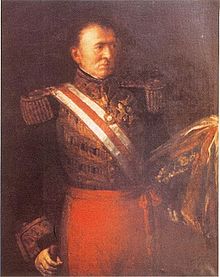Antonio de Quintanilla
Antonio de Quintanilla | |
|---|---|
 | |
| Royal Governor of Chiloé | |
| In office 1820–1826 | |
| Monarch | Ferdinand VII |
| Preceded by | Ignacio María Justiz y Urrutia |
| Personal details | |
| Born | 1787 Pámanes, Spain |
| Died | 1863 Almería, Spain |
| Military service | |
| Allegiance | |
| Rank | Brigadier |
| Battles/wars | Chilean War of Independence |
Antonio Quintanilla (Pámanes, Spain; 1787 - † Almería, Spain; 1863) was a Spanish brigadier and Governor of Chiloé from 1820–1826. He was the last royalist to hold the position.[1]
Background
Quintanilla was the son of Francisco de Quintanilla and Teresa Herrera y Santiago, who were members of distinguished families in the Spanish region of Pámanes.[2] He was born November 14, 1787.[2]
He married Antonia Álvarez de Garay,[2] the daughter of Captain Francisco alvarez and Bartola Garay.[3]
Governor of Chiloé
As a governor of Chiloé, Quintanilla ordered in 1824 the construction of Fuerte Real de San Carlos.[4] He is also noted for defeating General Ramón Freire's first attempt to liberate Chiloé in 1825 after he dissolved the Chilean congress by force.[5] By January 1826, Quintanilla finally surrendered and became the last Spanish official to withdraw from Chile.[5] He came back to Spain and served as a brigadier of the Santander barracks then the deputy general of La Mancha police.
Quintanilla was the father of Antonio de Quintanilla Alvarez, a Spanish official given the Carlist title of Marquis de Quintanilla.[6]
References
- ^ Cruz, Juan Luis Ossa Santa (2014). Armies, Politics and Revolution: Chile, 1808-1826. Liverpool: Liverpool University Press. p. 214. ISBN 9781781381328.
- ^ a b c Marín, Manuel Torres (1985). Quintanilla y Chiloé: la epopeya de la constancia (in Spanish). Santiago: Andres Bello. pp. 2, 86.
- ^ Harriet, Fernando Campos (1976). Los Defensores del Rey, Segunda Edicion (in Spanish). Santiago: Andres Bello. p. 275.
- ^ Sahady Villanueva, Antonio; Bravo Sánchez, José; Quilodrán Rubio, Carolina (2011). "Fuertes españoles en Chiloé: las huellas de la historia en medio del paisaje insular". Revista INVI. 73 (26): 133–165. Retrieved 30 January 2016.
- ^ a b Collier, Simon; Sater, William (2004). A History of Chile, 1808-2002, Second Edition. Cambridge: Cambridge University Press. p. 49. ISBN 0521827493.
- ^ Marín, Manuel Torres (1985). Quintanilla y Chiloé: la epopeya de la constancia (in Spanish). Santiago: Andres Bello. p. 87.
